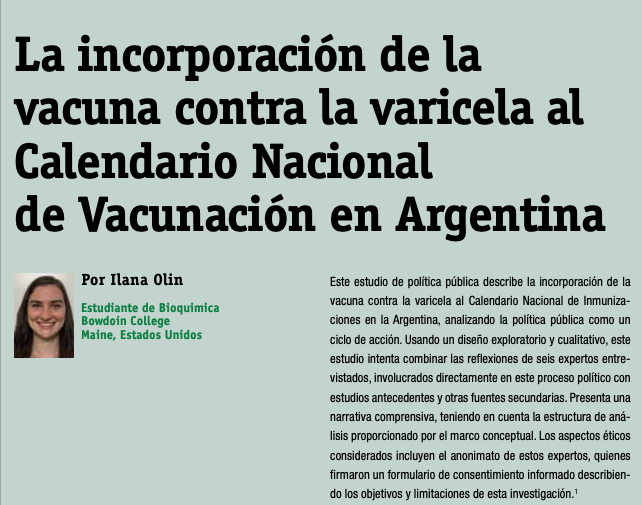Bowdoin biochemistry, philosophy student publishes vaccination research in Argentinian journal
February 7th, 2020 | SIT Study Abroad
By Rebecca Goldfine
This story was originally published on the Bowdoin College website. It is reprinted here with permission.

During her study-abroad semester in Buenos Aires with the School for International Training (SIT), Ilana Olin investigated an aspect of Argentina's healthcare system markedly different from the US system.
In Argentina, all citizens must adhere to a mandatory schedule of state-sponsored vaccines. "People in Argentina generally believe they have a right to health care," Olin said. To put this belief into practice, the government both requires vaccines and also ensures everyone has access to them.
Inevitably, this process excludes any personal antipathy to vaccinations. "Parents don't have a say in whether their children get vaccinated in the way they do here," Olin added.
People were shocked when I asked, 'Well, what if the parents don't want the vaccine?'
As part of her study-abroad program's curriculum, Olin pursued an independent research project analyzing the rollout of a recent policy requiring all Argentinian children receive the chicken pox vaccination. The addition of this particular vaccine to the National Calendar of Vaccinations served as a case study for Olin to explore how a nation's "ideology around health care is reflected in its laws and in its practice," she explained.
"People were shocked when I asked, 'Well, what if the parents don't want the vaccine?" she recalled. Olin interviewed six Argentinians who had been directly involved in drafting and implementing the 2015 chicken pox vaccination plan. Her objective was to "understand the process by which national authorities and a technical-scientific team came to the decision to add the chicken pox vaccine to the National Vaccination Calendar as a policy of expanding health rights."

She wrote up her findings in a paper, which was recently published by Universidad iSALUD's journal for faculty and student research, Revista Isalud. Olin is fluent in Spanish, and also received writing assistance from a Spanish tutor to polish her piece.
I arrived with my [American] understanding of rights relating to health care and sought to understand a system in which fundamentally different assumptions are made, and that makes the case study more interesting.
It is rare for SIT students — who are all from the United States and who are only in Argentina for a short time — to have work published by iSALUD, the nation's top health university. Olin said she thought her philosophical approach to the topic, as well as her perspective as an American, gave her work wider appeal.
"I arrived with my [American] understanding of rights relating to health care and sought to understand a system in which fundamentally different assumptions are made, and that makes the case study more interesting," she said.
Within the field of philosophy, Olin has been particularly drawn to the study of bioethics, as it brings together her interests in both philosophy and medicine. "I am interested in the principles underlying health care systems. My philosophy education at Bowdoin has focused on moral theory, and that was something I was interested in when I went to Argentina: seeing how different beliefs around morality influence health care," she said.
She is currently applying to MD/PhD programs to pursue a career as a physician-scientist involved in both research and patient care. She also hopes to work in a diverse community where her fluency can better serve Spanish-speaking patients.
Olin anticipates that her experience in Argentina will shape her path in the years to come. "It was fascinating to see how moral judgments can influence what healthcare policy looks like in practice," she said. "As I look to enter the worlds of medicine, science, and health care, seeing how the cultural values we have can determine patient outcomes is something that I feel like I am now better equipped to face."
